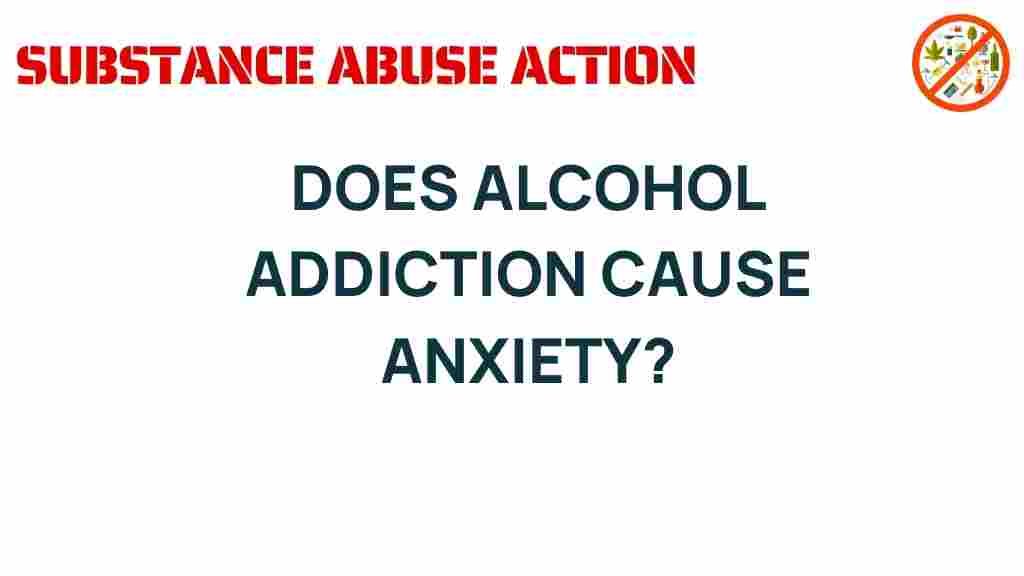Unraveling the Connection: Does Alcohol Addiction Fuel Anxiety?
Alcohol addiction and anxiety are two interlinked issues that can significantly impact mental health. Understanding the relationship between these two conditions can help individuals navigate their struggles and seek effective treatment. In this article, we will explore how alcohol addiction fuels anxiety, the implications for mental well-being, and practical coping strategies for recovery.
The Link Between Alcohol Addiction and Anxiety
Alcohol addiction often leads to a cycle of anxiety and substance use. Many individuals turn to alcohol as a means of coping with stress, but this often exacerbates their anxiety in the long run. Here are several ways in which alcohol addiction can fuel anxiety:
- Physical Effects: Alcohol alters brain chemistry, leading to changes in mood and anxiety levels.
- Withdrawal Symptoms: As the body becomes dependent on alcohol, withdrawal can induce severe anxiety and panic attacks.
- Social Isolation: Alcohol addiction can lead to social withdrawal, increasing feelings of loneliness and anxiety.
- Financial and Legal Issues: The consequences of addiction often lead to stressors that heighten anxiety levels.
The Impact on Mental Health
Understanding how alcohol addiction impacts mental health is crucial for those seeking treatment. Anxiety disorders can manifest in various ways, including generalized anxiety disorder, panic disorder, and social anxiety disorder. Here are some mental health implications of alcohol addiction:
- Increased Anxiety Levels: Alcohol may initially provide relief, but as its effects wear off, anxiety can return stronger than before.
- Co-occurring Disorders: Individuals with alcohol addiction often face other mental health issues, complicating treatment.
- Negative Coping Mechanisms: Using alcohol as a coping mechanism can lead to a cycle of dependence and increased anxiety.
Seeking Treatment for Alcohol Addiction and Anxiety
Treatment for alcohol addiction and anxiety requires a comprehensive approach tailored to individual needs. Here’s a step-by-step process to seek effective treatment:
- Assessment: Consult with a mental health professional to evaluate the severity of both alcohol addiction and anxiety.
- Detoxification: Undergo a medically supervised detox to manage withdrawal symptoms safely.
- Therapy: Engage in therapy options such as cognitive-behavioral therapy (CBT) or dialectical behavior therapy (DBT) to address underlying issues.
- Support Groups: Join support groups like Alcoholics Anonymous (AA) to connect with others facing similar challenges.
- Medication: Consult a psychiatrist to explore medication options that can help manage anxiety symptoms.
Support Systems for Recovery
Recovering from alcohol addiction and managing anxiety can be a challenging journey. Building a strong support system is essential for emotional well-being. Here are some support options:
- Friends and Family: Engage with loved ones who can provide emotional support and understanding.
- Therapists and Counselors: Professional guidance can help individuals develop coping strategies and work through trauma.
- Support Groups: Community support can be found in local or online groups focused on addiction recovery.
- Hotlines: Utilize helplines for immediate support when feeling overwhelmed.
Prevention Strategies for Alcohol Addiction and Anxiety
Preventing alcohol addiction and its associated anxiety is critical for maintaining mental health. Here are some effective prevention strategies:
- Education: Increase awareness of the risks associated with alcohol use and its impact on mental health.
- Healthy Coping Mechanisms: Encourage healthy ways to cope with stress, such as exercise, meditation, and hobbies.
- Limit Alcohol Consumption: Set personal limits on alcohol use to reduce the risk of dependency.
- Seek Help Early: If struggling with alcohol use, seek help before it escalates to addiction.
Coping Strategies for Managing Anxiety
Implementing coping strategies can help individuals manage anxiety, especially during recovery from alcohol addiction. Consider the following techniques:
- Mindfulness and Meditation: Practicing mindfulness can reduce anxiety by promoting a sense of calm and presence.
- Physical Activity: Regular exercise can improve mood and reduce anxiety levels.
- Healthy Eating: A balanced diet can positively influence mental health and emotional well-being.
- Journaling: Writing down thoughts and feelings can provide clarity and emotional release.
Troubleshooting Common Challenges
During recovery, individuals may face various challenges. Here are some common issues and troubleshooting tips:
- Cravings: If cravings arise, distract yourself with a hobby or call a supportive friend.
- Relapses: Understand that relapses can occur. Learn from them and seek support immediately.
- Isolation: Combat feelings of isolation by actively participating in support groups or community events.
- Stress Management: Use relaxation techniques like deep breathing or yoga to manage stress effectively.
Conclusion
Understanding the connection between alcohol addiction and anxiety is vital for anyone struggling with these issues. By recognizing the impact of alcohol on mental health, individuals can take proactive steps toward recovery and emotional well-being. Treatment options, support systems, and effective coping strategies are available to aid in overcoming these challenges.
If you or a loved one is facing the dual challenges of alcohol addiction and anxiety, don’t hesitate to reach out for help. Support is available, and recovery is possible. For more information on mental health resources, visit this external resource.
For additional support and community, explore local support groups or online forums to connect with others who understand your journey. Together, we can foster a healthier and more supportive environment for all.
Remember, you are not alone in this struggle, and with the right tools and support, recovery is within reach.
This article is in the category Addiction and created by SubstanceAbuseAction Team
